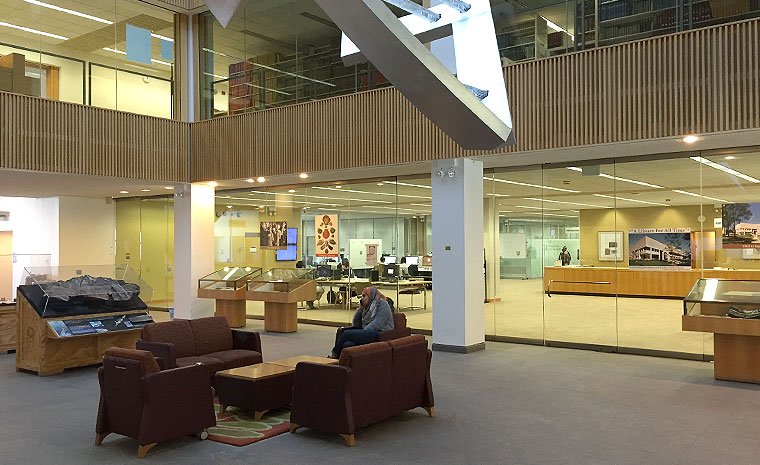This exhibit was curated by Jennifer Hart and Deb Werner
The Darwin Centennial Celebration, commemorating the 1859 publication of Charles Darwin's On the Origin of Species by Means of Natural Selection, was held at the University of Chicago from November 24 through November 28, 1959. Sol Tax, Professor of Anthropology, served as the chairman of the Centennial Committee. The interdisciplinary Centennial Committee also included Alfred E. Emerson (Department of Zoology), Chauncy D. Harris (Department of Geography), Everett E. Olson (Department of Geology), H. Burr Steinbach (Department of Zoology), and Ilza Veith (Medicine). The Darwin Centennial Celebration had several sponsors besides the University of Chicago, including the National Science Foundation, the National Institutes of Health, and the Wenner-Gren Foundation for Anthropological Research.
The Celebration began appropriately enough on November 24, the date of the one hundredth anniversary of the publication of On the Origin of Species. That afternoon featured a panel discussion on "The Origin of Life," the first of five topical panels planned for the Celebration. The scholars participating in these panel discussions produced papers several months in advance of the conference that were read and criticized by the other participating scholars. These papers formed the basis for the five panel discussions, but the papers themselves were not read. The discussions were wholly spontaneous. The first day concluded with a lecture by Sir Charles Darwin, grandson of Charles Darwin, entitled "Darwin the Traveler," in which he described the famous voyage of the Beagle.
Another of the Centennial's central participants was Sir Julian Huxley, grandson of 19th century evolutionist Thomas Huxley. Huxley played a unique role in the Celebration. In an attempt to create unity among disparate topics, the Centennial Committee asked Huxley to read and provide editorial comments on each of the participants' papers. Huxley also drew sustained attention from the media because of his comments that the growth in human population would have disastrous consequences. On the second day of the celebration, November 25, Huxley made his first scheduled appearance and co-chaired Panel 2, "The Evolution of Life," with University of Chicago zoology professor Alfred E. Emerson. This was followed by a showing of the film The Ladder of Life, and finally, L.S.B. Leakey's illustrated lecture, "The Origin of the Genus Homo."
Thursday, November 26 was Thanksgiving Day, and the holiday was a busy one for Celebration attendees. Panel 3, "Man as an Organism," which featured prominent figures such as Leakey and micropaleontologist Cesare Emiliani, took place in the morning hours. The Chicago Tribune reported on this panel's consideration of whether humans ever had tails, a question brought up by University of Michigan professor Marston Bates. A special Convocation of the University was held that afternoon in the University's Rockefeller Chapel. In his controversial Convocation address, "The Evolutionary Vision," Sir Julian Huxley proposed that religion, being subject to the laws of evolution, was fast becoming obsolete and would eventually evolve itself out of existence. That evening's more lighthearted festivities included a Thanksgiving Dinner and the debut performance of Time will Tell, a musical about Darwin's life and work that was written by Robert Pollak and Robert Ashenhurst.
Panel 4, "The Evolution of the Mind," took place on the morning of November 27, and it included scientists from several disciplines, including Dutch ornithologist N. (Nikolaas) Tinbergen and British neurologist Macdonald Critchley. That afternoon, the Institute for High School Biology Teachers examined the problems of teaching evolutionary theory in public schools.
The final day of the Celebration, November 28, featured Panel 5, "Social and Cultural Evolution," The day also included two institutes, the second part of the Institute for High School Biology Teachers and the Institute on Science and Theology. With the participation of political philosopher Leo Strauss among others, the latter examined the relation of science, and more specifically evolution, to theology.
Sol Tax concluded the Darwin Centennial Celebration, not with a synthesis of the science discussed, but with key questions about how Darwin's legacy will continue to affect human culture and the study of it. Among his arguments was what he saw as the detrimental impact of denying evolution. "No matter what gets done about our religious beliefs.... [w]e cannot deal with the difficult problems of the world unless our education takes account of the demonstrated empirical fact."
Tax, however, ended the week with a hopeful and unifying note. "Is it possible," Tax asked the audience, "that this week becomes indeed a turning point in human history to which we are witnesses?"
David Pavelich
Reference and Instruction Librarian
Special Collections Research Center
